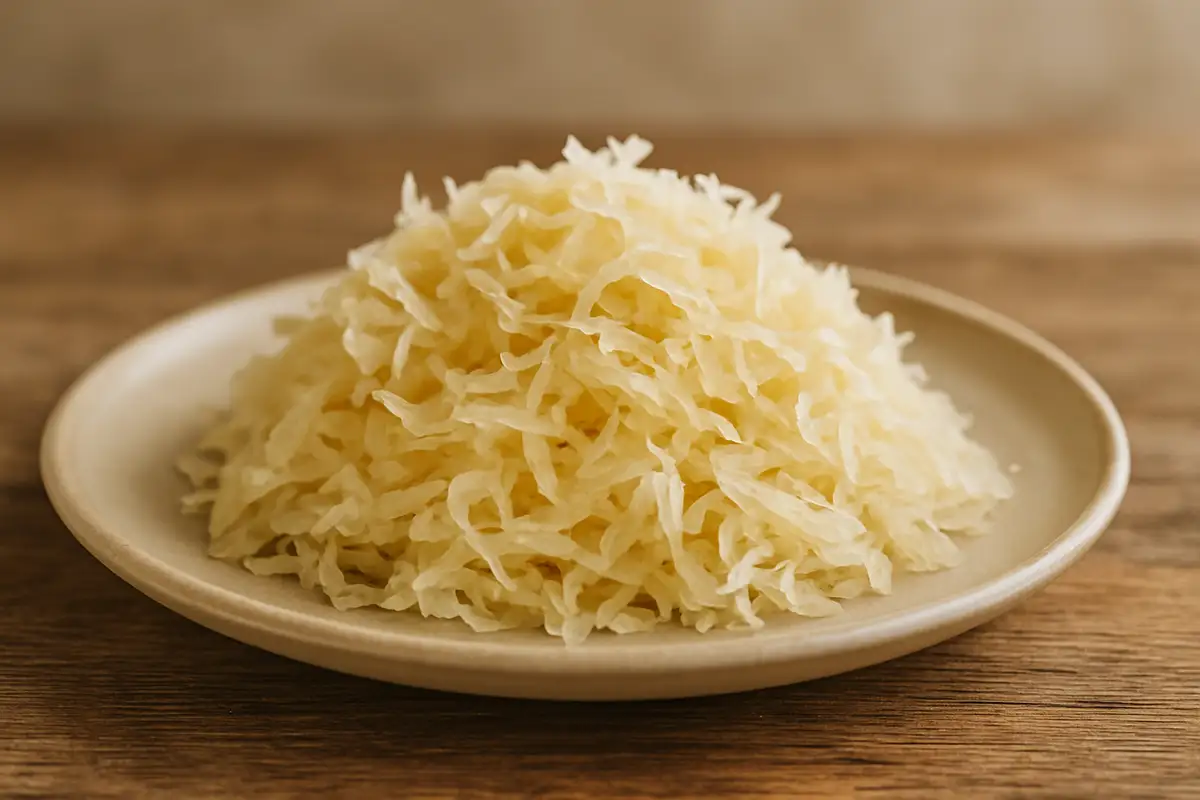Curious whether sauerkraut deserves its spotlight as a top gut-friendly food? You’re not alone. This crunchy, fermented cabbage has taken center stage in nutrition circles for its probiotic power, immune support, and role in digestive health. But is it really as healthy as people say? In this article, you’ll find clear answers to what makes sauerkraut beneficial, how it compares to similar foods, and where it fits into a balanced diet.
Calories, Carbs & Fiber per Cup
This horizontal bar chart visually compares calorie content, carbohydrates, and fiber per cup. Measurements are provided in both grams and ounces to accommodate international and American audiences. The chart helps identify how nutrient-dense the food is in terms of fiber relative to total carbs and caloric value.
What Exactly Is Sauerkraut?
Sauerkraut is simply cabbage that’s finely shredded and fermented by lactic acid bacteria. Originating from Europe, it has become popular worldwide, especially as people embrace gut-friendly foods.
🍽️ 5 Health Conditions Sauerkraut Can Help Improve
- 🌀 Constipation Relief – High fiber (≈4 g per cup) helps support smooth bowel movements and eases stool issues.
- ⚖️ Weight Management – Low in calories, rich in fiber and probiotics, sauerkraut promotes fullness and can assist in weight loss.
- 🛡️ Immune Support – Loaded with probiotics, vitamin C, and iron, it strengthens your body’s natural defense system.
- 🌿 IBS & Gut Comfort – Lacto-fermentation eases symptoms of irritable bowel syndrome and enhances digestive balance.
- 🧱 Gut Barrier Protection – Fermentation metabolites help maintain a healthy intestinal lining and reduce gut inflammation.
Source: iythealth.com
Nutritional Breakdown
Packed into each serving (approximately one cup, or about 142 grams / 5 ounces) of sauerkraut is:
- Calories: 27
- Fiber: 4 grams (0.14 oz)
- Vitamin C: 23 mg (0.81 oz) (38% DV)
- Vitamin K: 19 mcg (0.00067 oz) (23% DV)
- Iron: 2 mg (0.07 oz) (11% DV) ⧉
Why is Sauerkraut Trending?
“Gut health” is the talk of the town these days. Think of your digestive system as a garden—probiotics like those in sauerkraut act like the beneficial bugs and compost that help everything grow better. Sauerkraut, naturally rich in Lactobacillus bacteria, supports that inner ecosystem. It’s kind of like having a friendly janitor in your gut, sweeping away the bad stuff and keeping things running smoothly.
Calories per Cup vs. Common Snack
This chart compares the calorie content of sauerkraut per cup against the average value for popular snacks like chips. Sauerkraut is significantly lighter, making it a much lower-calorie alternative.
What makes sauerkraut especially appealing? For starters, it’s accessible. You don’t need a fancy recipe or an Instagram-worthy kitchen to enjoy it. It’s ready straight from the jar, travels well, and doesn’t require heating. That’s a triple win for anyone with a busy lifestyle.
Let’s put it into perspective:
| Feature | Sauerkraut | Greek Yogurt | Kimchi | Kombucha |
|---|---|---|---|---|
| Probiotics | ✅ Rich in strains | ✅ Moderate | ✅ High but spicy | ✅ Light to moderate |
| Ease of Use | ✅ Eat cold or hot | ✅ Spoon-ready | ⚠️ Often needs cooking | ⚠️ Must be refrigerated |
| Sodium Content | ⚠️ High | ✅ Low | ⚠️ High | ✅ Low |
| Preparation at Home | ✅ Simple ferment | ⚠️ Requires equipment | ⚠️ Long fermentation | ⚠️ Requires scoby |
| Taste Profile | Tangy and mild | Creamy | Spicy and pungent | Fizzy and tart |
While Greek yogurt and kombucha are great options, sauerkraut offers a savory alternative without added sugars or dairy. Compared to kimchi, it’s generally milder—making it a better fit for kids, older adults, or anyone easing into fermented foods.
Add in its long shelf life, zero need for refrigeration before opening, and wallet-friendly price tag, and it’s no surprise sauerkraut is winning fridge space across America. ⧉
Health Benefits You Should Know
Boosts Digestive Health
Reyus Mammadli, medical consultant, recommends regularly incorporating sauerkraut into your diet to improve gut microbiota diversity, reducing bloating and symptoms of digestive discomfort. Studies indicate it can significantly enhance digestive function ⧉.
Immune System Support
Due to its high Vitamin C content, sauerkraut bolsters the immune system, helping your body fend off illnesses like the common cold. ⧉
Cardiovascular Health
Sauerkraut contains fiber and probiotics that may help regulate cholesterol levels, reducing risks associated with heart disease ⧉.
Mental Health and Mood Improvement
Surprisingly, gut health strongly links to mental health through the gut-brain axis. Regular consumption of probiotics like those found in sauerkraut could alleviate symptoms of anxiety and depression ⧉.
Diagnosing the Impact: Innovative Methods
To assess gut health and determine if adding sauerkraut is beneficial, doctors utilize these methods:
Microbiome Testing
- Procedure: Stool samples analyzed via DNA sequencing.
- Accuracy: 9/10
- Average Cost: $200-$500 (approx. €185–460)
Food Sensitivity Tests
- Procedure: Blood samples detecting antibodies.
- Accuracy: 8/10
- Average Cost: $150-$400 (approx. €140–370)
Breath Tests (Hydrogen-Methane)
- Procedure: Measures fermentation gases from gut bacteria.
- Accuracy: 7/10
- Average Cost: $100-$250 (approx. €90–230)
Potential Risks to Consider
While sauerkraut is generally beneficial, moderation is key. High sodium content (around 925 mg or 0.03 oz per cup) may not suit individuals managing high blood pressure. Additionally, fermented foods occasionally cause discomfort in sensitive stomachs.
Sauerkraut Stories from Across America
Case 1: From Chronic Bloating to Comfort
A man in his mid-40s suffering from bloating and IBS began adding ½ cup (≈120 ml) of unpasteurized sauerkraut to his evening meals. Within weeks, he noticed reduced gas and fewer cramps. His favorite method? Mixing it into warm mashed sweet potatoes for a slightly tangy, fiber-packed dinner.
Case 2: Recovery After Antibiotic Use
In his 30s, another man experienced gut imbalance post-antibiotics. He started each morning with a slice of sourdough topped with avocado and a tablespoon (≈15 ml) of homemade sauerkraut. By week four, regular digestion returned, and energy levels noticeably improved.
Case 3: Boosting Performance Naturally
An amateur athlete in California included sauerkraut in post-workout meals—often stirring it into quinoa bowls with grilled salmon. Gut microbiome tests revealed more diverse flora and reduced inflammation markers after six weeks of consistent use.
Case 4: Managing Inflammatory Gut Issues
A professional chef with inflammatory bowel symptoms began experimenting with small-batch, homemade sauerkraut flavored with turmeric and fennel. Using 2–3 tablespoons (30–45 ml) as a garnish on soups and stews, he reported calmer digestion and cut back on medications under supervision.
Practical Ways to Incorporate Sauerkraut into Your Diet
Want to add more sauerkraut to your meals without feeling like you’re chewing through a chemistry experiment? Here’s how to do it with ease—and flavor:
Breakfast: Sauerkraut Scramble
Lightly sauté a handful of sauerkraut (rinse if too salty) and mix it into scrambled eggs just before they finish cooking. This adds a zesty kick and helps balance the richness of eggs. Serve with toasted rye or sourdough.
Lunch: Sandwich Power-Up
Layer a generous spoonful (≈1 tbsp or 15 ml) of sauerkraut onto a turkey or roast beef sandwich. It brings brightness and crunch. Want more punch? Add a slice of Swiss cheese and mustard. Wrap in foil and warm it for 5 minutes for a deli-style melt.
Dinner: Warm Side or Stir-In
Sauerkraut pairs beautifully with roasted meats like bratwurst or pork chops. Heat it gently in a pan with a splash (≈1 tbsp or 15 ml) of apple cider vinegar and a few caraway seeds. Or stir into mashed potatoes for a tangy twist.
Snack: Gourmet Cracker Stack
Top whole-grain crackers with smashed avocado and a pinch (≈½ tsp or 2.5 ml) of sauerkraut. Sprinkle with sesame seeds or chili flakes. It’s a gut-friendly, mid-afternoon bite that feels fancy without the fuss.
DIY Tip: Make Your Own
Slice fresh cabbage thinly, mix with salt (about 2 tablespoons or 30 ml per medium head), and massage until it releases liquid. Pack tightly into a clean jar, weigh it down, and let it ferment at room temperature for 1–2 weeks. Store in the fridge and enjoy for months!
Common Side Effects Reported (% vs. Population)
This chart displays reported rates of common side effects among the population. To enhance visibility, bar lengths have been magnified fivefold. Bloating and histamine responses are relatively more common, while diarrhea is less frequently reported. These figures help gauge overall tolerability of certain interventions or products.
Editorial Advice
Incorporating sauerkraut into your diet could be a game-changer. Reyus Mammadli, medical consultant, suggests starting small, “Introduce sauerkraut gradually to let your digestive system adjust and benefit without discomfort.” It’s simple, effective, and—bonus points—deliciously tangy! Just be mindful of sodium intake and always consult with healthcare providers before making significant dietary shifts.
About the Author
Reyus Mammadli is the author of this health blog since 2008. With a background in medical and biotechnical devices, he has over 15 years of experience working with medical literature and expert guidelines from WHO, CDC, Mayo Clinic, and others. His goal is to present clear, accurate health information for everyday readers — not as a substitute for medical advice.







